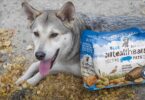Did you know 65% of adult pets struggle to digest dairy? While pet owners often share bites of their snacks, lactose intolerance makes many common human foods risky. This raises an important question: Can creamy, protein-packed yogurt be an exception?
Plain, unsweetened varieties (especially Greek-style) offer calcium and probiotics that may support digestive health. These nutrients can help maintain strong bones and a balanced gut. But not all products are created equal—some contain additives like xylitol, which is deadly for canines.
Before adding this dairy item to a pet’s diet, it’s critical to check labels. Avoid artificial sweeteners and opt for simple ingredients. Start with small portions to monitor tolerance, as even safe options might upset sensitive stomachs.
This article explores how to responsibly incorporate yogurt into meals, its nutritional perks, and potential red flags. Learn how to balance taste and safety while keeping tails wagging.
Exploring Yogurt for Dogs: Nutritional Insights
Can certain dairy products offer hidden benefits for your canine? Plain varieties of fermented milk contain nutrients that support bone density and muscle function. A single cup provides 30% of a dog’s daily calcium needs and 10 grams of protein, according to veterinary nutrition studies.
Essential Building Blocks in Every Spoonful
Calcium strengthens teeth and skeletal structures, while protein aids tissue repair. These elements are particularly valuable for active or aging pets. However, lactose—a natural sugar in dairy—can cause discomfort for some animals. Choosing low-lactose options minimizes this risk.
Gut Health Allies at Work
Live active cultures act as natural probiotics, promoting balanced intestinal flora. Research indicates these microorganisms improve nutrient absorption and reduce occasional loose stools. Start with teaspoon-sized portions to assess tolerance before making it a regular dietary addition.
While beneficial, this food shouldn’t exceed 10% of daily calories. Later sections will detail how to identify quality products and calculate safe serving sizes based on weight.
Potential Risks and Side Effects of Dairy in Dogs
While some pets tolerate small amounts of fermented milk, many adult canines lose the ability to process lactose after weaning. This natural sugar found in dairy requires specific enzymes for digestion, which often diminish with age. Pet owners should watch closely when offering any milk-based products.
Lactose Intolerance and Digestive Issues
Signs of intolerance typically appear within hours. Mild reactions include stomach gurgling or excessive gas. More severe cases might involve loose stools or repeated trips outside. These symptoms indicate the digestive system struggles to break down lactose effectively.
Identifying Symptoms: Diarrhea, Vomiting, and More
Persistent diarrhea or sudden vomiting requires immediate attention. Some products contain xylitol, an artificial sweetener lethal to canines. Always check labels for hidden ingredients before sharing human foods.
Start with pea-sized portions to test tolerance. Track changes in energy levels or bathroom habits over 24 hours. Contact a veterinarian if discomfort persists beyond a day or worsens rapidly.
Remember: Even pet-safe options shouldn’t replace balanced meals. Use dairy sparingly as occasional treats rather than dietary staples.
How to Safely Incorporate Yogurt into Your Dog’s Diet
Introducing new foods requires careful steps to maximize benefits while minimizing risks. Start by choosing products specifically designed for sensitive systems. Always prioritize safety over convenience when selecting snacks.
Selecting Plain and Unsweetened Options
Check labels for three red flags: added sugars, artificial sweeteners like xylitol, and flavorings. Plain varieties with active cultures offer the best nutritional value. Low-fat options reduce digestive strain while delivering calcium and protein.
Proper Serving Guidelines by Size
Portion control prevents stomach upset. Follow these recommendations:
- Small breeds (under 20 lbs): 1 teaspoon daily
- Medium dogs (20-50 lbs): 2 teaspoons
- Large companions (50+ lbs): 1 tablespoon
Mix into regular meals twice weekly for digestive support. Watch for signs of gas or loose stools, which indicate reduced portions are needed. Always discuss dietary changes with your veterinarian, especially for pets with health conditions.
When used correctly, these dairy products can enhance gut health through natural probiotics. Remember—treats shouldn’t exceed 10% of daily calories. Balance is key to maintaining optimal nutrition.
Comparing Yogurt Benefits with Other Dairy and Probiotic Options
Pet owners face numerous options when selecting supplements to support their companion’s digestion. Understanding nutritional profiles helps balance benefits with potential risks.
Greek vs. Regular: Breaking Down the Differences
Greek varieties typically contain twice the protein and half the sugar of standard options. This makes them favorable for maintaining muscle mass without spiking calorie intake. The straining process also reduces lactose content, which may ease digestion for sensitive pets.
Beyond Dairy: Probiotic Alternatives
Veterinarians often recommend species-specific supplements like FortiFlora®. These products deliver targeted bacterial strains without dairy-related risks. Fermented vegetables and specially formulated chews provide additional sources of gut-friendly microbes.
While small amounts of plain dairy can enhance meals, they shouldn’t displace complete nutrition. Always verify ingredient lists for harmful additives like xylitol. Consult your vet to determine appropriate serving sizes based on weight and health history.
Final Thoughts on Treating Your Canine Companion to Yogurt
Every spoonful shared with your furry friend carries both potential rewards and risks. When chosen carefully, plain varieties can deliver probiotics and calcium to support digestion and bone health. But hidden dangers like lactose intolerance or toxic additives demand vigilance.
Always prioritize simple, unsweetened products free from artificial sweeteners. Start with tiny portions and watch for reactions like stomach upset. Remember: What suits one pet might harm another. A quick chat with your vet ensures personalized guidance.
Consider this dairy option as just one piece of the nutritional puzzle. Pair it with vet-approved treats and balanced meals for optimal results. Track your companion’s energy levels and digestion after introducing new foods.
Ultimately, a thoughtful approach keeps tails wagging safely. Your attention to ingredient labels and portion sizes shows love in action—nourishing their health while celebrating shared moments.
FAQ
Can dairy products cause digestive problems in pets?
Many adult dogs struggle to digest lactose, a sugar found in milk-based items. This can lead to gas, diarrhea, or vomiting. Opt for lactose-free options like plain, unsweetened yogurt with live cultures, which are gentler on sensitive stomachs.
How do probiotics in certain foods support canine health?
Active cultures in fermented dairy help balance gut bacteria, improving digestion and immune function. Look for labels stating “live and active cultures” to ensure maximum benefits. Introduce small amounts gradually to avoid upsetting their system.
What’s the difference between Greek and regular varieties for pets?
Greek styles have higher protein and lower lactose due to straining, making them safer for lactose-sensitive dogs. However, always avoid added sugars or artificial sweeteners like xylitol, which are toxic to animals.










Leave a Comment